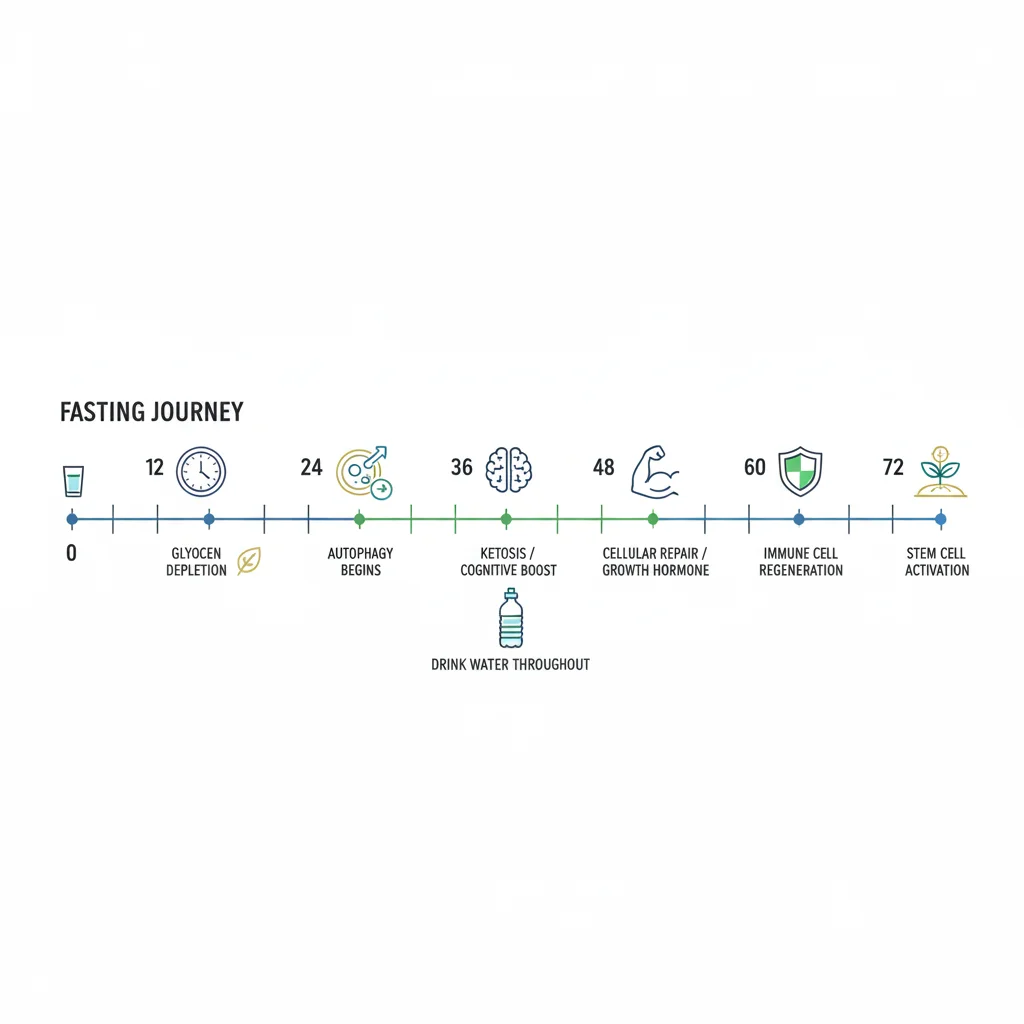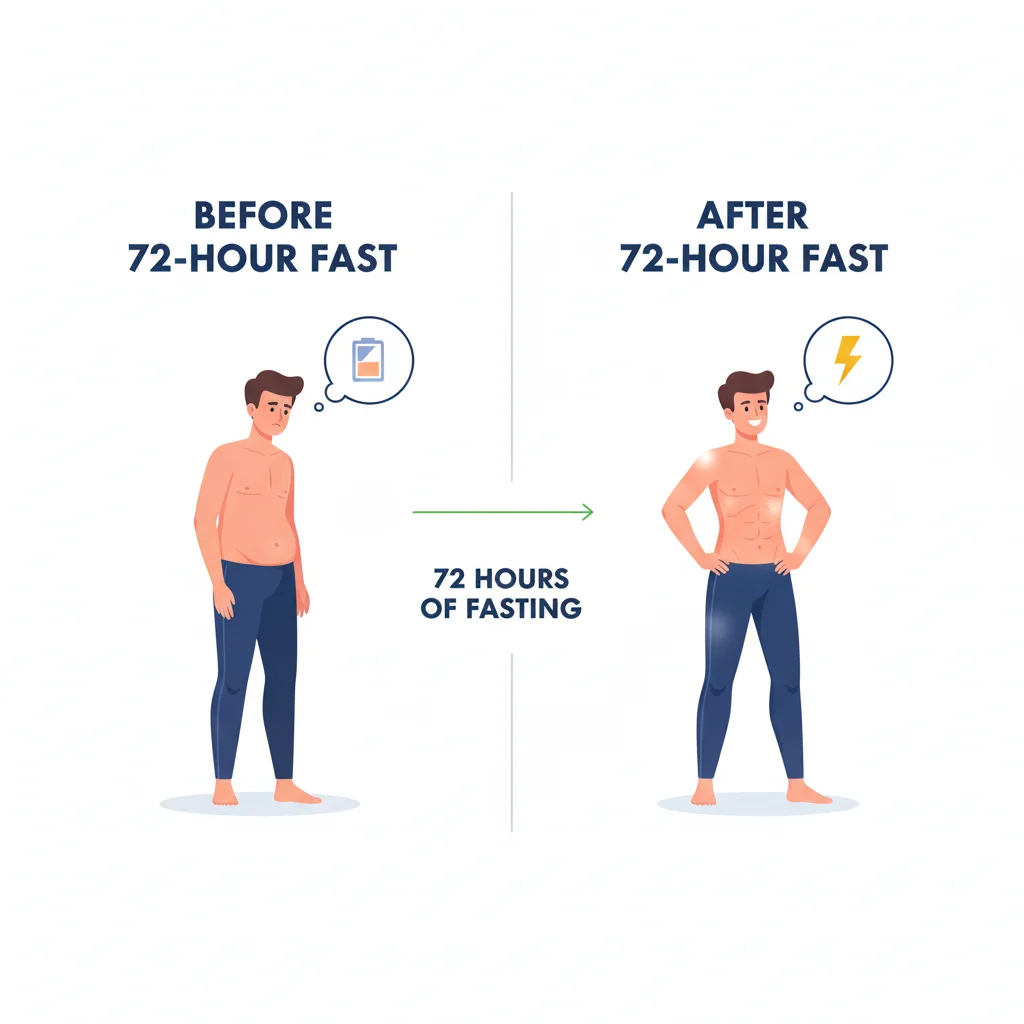The 72-hour fast has emerged as one of the most discussed approaches to extended fasting, capturing attention for its potential health benefits and the profound changes it can trigger in the human body. As interest in long fasting for health continues to grow, understanding what happens during a 72-hour fast, its benefits, risks, and safety considerations becomes crucial for anyone considering this practice.
A 72-hour fast involves abstaining from all food for three consecutive days, typically consuming only water, though some variations may include black coffee or plain tea. This extended fasting period goes beyond intermittent fasting protocols and enters the realm of prolonged fasting, where significant metabolic and cellular changes occur.
What Happens to Your Body During a 72-Hour Fast
Understanding what happens to your body during a 72-hour fast reveals the complex biological processes that make this practice both potentially beneficial and inherently challenging. The journey begins within the first 12 hours when your body depletes its readily available glucose stores and begins transitioning to alternative energy sources.
During the initial 24 hours of your 72-hour fast, your body starts mobilizing stored glycogen from the liver and muscles. As these reserves become depleted, typically around the 18-24 hour mark, your metabolism undergoes a fundamental shift. The body begins producing ketones from stored fat, entering a state called ketosis, which becomes the primary fuel source for your brain and organs.
The second day of a 72-hour fast often presents the most significant challenges as your body fully adapts to using ketones for energy. This metabolic transition can cause temporary side effects including headaches, fatigue, and difficulty concentrating. However, this is also when many of the profound cellular changes associated with 72-hour fasting and autophagy begin to accelerate.
By the third day, most individuals experience stabilized energy levels and mental clarity as their body becomes fully adapted to burning fat for fuel. The science behind 72-hour fasting shows that autophagy—the cellular recycling process—reaches peak activity during this extended fasting period, potentially providing numerous health benefits.
The Science Behind 72-Hour Fasting and Autophagy
Accumulated evidence suggests that intermittent fasting or calorie restriction can lead to the induction of adaptive autophagy and increase longevity of eukaryotic cells. The relationship between 72-hour fasting and autophagy represents one of the most compelling aspects of extended fasting protocols.
Autophagy fasting explained in simple terms involves your cells essentially “eating themselves” to remove damaged components and recycle useful materials. This process, which intensifies significantly during extended fasting periods, serves as a critical maintenance mechanism that may contribute to cellular health and longevity.
Scientific studies on 72-hour fasting have demonstrated measurable changes in brain metabolism and cellular function. Research using magnetic resonance spectroscopic imaging has shown how the brain adapts to the metabolic stress of prolonged fasting, revealing the body’s remarkable ability to maintain function while undergoing significant metabolic changes.
The benefits of 72-hour fast protocols extend beyond simple weight loss. Research indicates that extended fasting can trigger beneficial changes in gene expression related to stress resistance, metabolism, and cellular repair. These molecular changes form the foundation for many of the claimed health benefits associated with prolonged fasting practices.

72-Hour Fast Health Benefits: What the Research Shows
The benefits of 72-hour fast protocols encompass multiple physiological systems, though it’s important to note that much of the research is still emerging. Understanding these potential benefits helps explain why interest in extended fasting continues to grow among health-conscious individuals.
Metabolic Benefits and Weight Loss Results
72-hour fast for weight loss results typically show significant short-term weight reduction, though much of the initial loss consists of water weight and glycogen stores. However, the metabolic benefits extend beyond simple calorie reduction. Studies suggest that extended fasting can improve insulin sensitivity and glucose metabolism, particularly in healthy individuals.
How much weight can you lose in a 72-hour fast varies considerably based on individual factors including starting weight, body composition, and metabolic rate. Most people can expect to lose 3-8 pounds during a 72-hour fast, though sustainable fat loss requires longer-term dietary changes beyond the fasting period.
Immune System and Cellular Health
The connection between 72-hour fast for immune system reset has garnered significant scientific interest. Prolonged fasting appears to trigger immune system regeneration by promoting the recycling of old immune cells and stimulating the production of new ones. Enhanced immunity occurs as the immune system becomes stronger during autophagy, which clears pathogens and speeds up antibody production.
👉 USC News – Fasting Triggers Stem Cell Regeneration of Immune System
Use this in the “Immune System Benefits” section.
Fasting to heal the body involves multiple mechanisms beyond immune system reset. The cellular repair processes activated during extended fasting may help address chronic inflammation and oxidative stress, both implicated in various age-related diseases.
Brain Health and Cognitive Function
Short-term fasting has been shown to induce profound neuronal autophagy, a key homeostatic process that may be neuroprotective. The effects on brain metabolism during extended fasting suggest potential benefits for cognitive function and neurological health.
Many individuals report improved mental clarity and focus during the later stages of a 72-hour fast, though initial cognitive effects may include brain fog and difficulty concentrating as the body adapts to ketone metabolism.
Is a 72-Hour Fast Safe? Understanding the Risks
The question “is a 72-hour fast safe?” requires careful consideration of individual health status, proper preparation, and ongoing medical supervision. While healthy adults may safely complete a 72-hour fast under appropriate conditions, this practice is not suitable for everyone.
Common Side Effects and Temporary Discomforts
Temporary side effects—such as headaches, difficulty concentrating, increased hunger, and low mood—are common, especially during the first 48 hours. Understanding these risks and side effects of 72-hour fasting helps individuals make informed decisions about whether this practice aligns with their health goals.
Research on prolonged water fasting has noted that headaches, insomnia, hunger, and dry mouth were frequently reported adverse events. These symptoms typically resolve as the body adapts to the fasting state, but they can significantly impact daily activities and quality of life during the fasting period.
“Many people turn to fasting for weight management, but some also explore supportive natural remedies. A proven option is this weight loss drink that works, which can complement the results of a 72-hour fast.”
Serious Health Considerations
More serious risks include electrolyte imbalances, dehydration, and potential complications in individuals with underlying health conditions. Medical supervision is recommended due to risks of electrolyte imbalances and other side effects that can occur during extended fasting periods.
Who Should Not Attempt a 72-Hour Fast
You should avoid fasting if you are pregnant, breastfeeding, underweight, diabetic, have a history of eating disorders, or take medication with food. Additionally, who should not attempt a 72-hour fast includes individuals with certain medical conditions, those under 18 years of age, and anyone with a compromised immune system.

How to Do a 72-Hour Fast Safely: A Step-by-Step Guide
Learning how to do a 72-hour fast safely requires careful preparation, proper execution, and gradual refeeding. This 72-hour water fast step by step guide provides essential information for those considering this extended fasting protocol.
Pre-Fast Preparation (1-2 Weeks Before)
Begin preparing for your 72-hour fast by gradually reducing processed foods, caffeine, and sugar from your diet. This preparation phase helps minimize withdrawal symptoms and makes the transition into fasting more comfortable. Consider practicing shorter fasting periods (16-24 hours) to assess your body’s response to food restriction.
Consult with a healthcare provider before attempting your first 72-hour fast, especially if you have any underlying health conditions or take medications. This consultation is crucial for ensuring that extended fasting is appropriate for your individual health status.
During the Fast: Hour-by-Hour Expectations
Hours 0-12: The initial phase typically involves manageable hunger as your body uses readily available glucose stores. Stay well-hydrated and maintain normal activities while listening to your body’s signals.
Hours 12-24: As glycogen stores deplete, you may experience increased hunger and some fatigue. This is normal as your body begins transitioning to fat metabolism. Continue drinking water regularly and consider light physical activity like walking.
Hours 24-48: The most challenging phase often occurs during this period as your body fully transitions to ketosis. Side effects like headaches, irritability, and brain fog may peak. When switching to using ketone bodies for energy, you might experience fatigue, brain fog, mild flu-like symptoms, irritability, or mood swings, though these side effects are temporary.
Hours 48-72: Many people report improved energy and mental clarity during this final phase as their body becomes fully adapted to ketone metabolism. Autophagy processes are likely at their peak during this time.
Breaking Your Fast: The Critical Refeeding Phase
Breaking a 72-hour fast correctly is arguably as important as the fast itself. The refeeding process should be gradual and thoughtful to avoid digestive distress and maintain the benefits achieved during fasting.
Start with small portions of easily digestible foods such as bone broth, cooked vegetables, or diluted fruit juices. Avoid large meals, processed foods, and high-fat or high-fiber foods immediately after breaking your fast. Gradually increase food intake over 24-48 hours to allow your digestive system to readjust.

72-Hour Fast vs Intermittent Fasting: Understanding the Differences
The comparison between 72-hour fast vs intermittent fasting highlights important distinctions in approach, benefits, and practical implementation. While intermittent fasting typically involves daily eating windows of 4-8 hours with 16-20 hour fasting periods, a 72-hour fast represents a completely different category of extended fasting.
“While fasting gives your digestive system a complete reset, certain natural foods can also boost gut health. For instance, studies highlight the surprising benefits of eating raw onion for improved immunity and cleansing.”
Intermittent fasting can be practiced regularly as a lifestyle approach, while 72-hour fasts are typically done occasionally—perhaps monthly or quarterly—due to their intensive nature. The benefits of water-only fasting during extended periods may be more pronounced than shorter fasting windows, but they also come with increased risks and require more careful medical oversight.
The metabolic changes during 72-hour fasting are more dramatic and sustained compared to daily intermittent fasting protocols. While both approaches can trigger autophagy and improve insulin sensitivity, the extended duration of a 72-hour fast allows for deeper metabolic adaptation and more significant cellular recycling processes.
72-Hour Fasting Results: What to Expect
Realistic expectations about 72-hour fasting results help individuals evaluate whether this practice aligns with their health and wellness goals. The 72-hour fast before and after effects encompass both immediate changes and potential longer-term benefits.
Immediate Physical Changes
Most people experience rapid weight loss during a 72-hour fast, typically ranging from 3-8 pounds. However, much of this initial weight loss consists of water weight and will return once normal eating resumes. The true fat loss from a single 72-hour fast is generally modest, perhaps 1-2 pounds of actual body fat.
Energy levels often fluctuate dramatically during the fasting period. Initial fatigue and weakness typically give way to stable energy and improved mental clarity by the third day. Many people report feeling lighter, more alert, and experiencing reduced inflammation after completing a 72-hour fast.
Metabolic and Cellular Benefits
The cellular benefits of extended fasting may persist for weeks or months after completing the fast. Improved insulin sensitivity, enhanced autophagy, and potential immune system benefits represent some of the longer-lasting effects that extend beyond the fasting period itself.
Psychological and Spiritual Aspects
Many individuals report psychological benefits from completing a 72-hour fast, including increased self-confidence, mental clarity, and a sense of accomplishment. The spiritual fasting and health connection has been recognized across cultures for centuries, with many people finding that extended fasting provides mental and emotional benefits alongside physical changes.

Medical Considerations and When to Seek Help
The importance of medical supervision becomes paramount when considering extended fasting protocols. Water fasting under medical supervision has been shown to provide benefits while minimizing risks, highlighting the importance of professional guidance for extended fasting periods.
Certain symptoms during a 72-hour fast warrant immediate medical attention, including severe dizziness, chest pain, severe headaches that don’t respond to hydration, signs of dehydration, or any concerning changes in heart rhythm. Having a healthcare provider familiar with fasting protocols can provide valuable support and monitoring during extended fasts.
Individuals with diabetes, eating disorders, cardiovascular disease, or those taking medications should never attempt a 72-hour fast without medical supervision. The metabolic changes during extended fasting can significantly impact blood sugar levels, medication effectiveness, and underlying health conditions.
Frequently Asked Questions About 72-Hour Fasting
Does a 72-hour fast cure diseases?
While 72-hour fasting may provide various health benefits, it’s important to understand that no single intervention “cures” chronic diseases. Extended fasting may support overall health and potentially help manage certain conditions, but it should be viewed as one component of a comprehensive health strategy rather than a cure-all solution.
Can a 72-hour fast reverse chronic illness?
The relationship between extended fasting and chronic illness management is complex and highly individual. While some research suggests that prolonged fasting may help address certain aspects of chronic conditions through mechanisms like reduced inflammation and improved insulin sensitivity, claims about “reversing” chronic illness should be approached with caution and discussed with qualified healthcare providers.
How often can you safely do a 72-hour fast?
The frequency of 72-hour fasts should be carefully considered based on individual health status and goals. Most experts suggest that extended fasts of this duration should not be performed more than once per month, and many recommend even less frequent intervals. Regular medical monitoring becomes increasingly important with repeated extended fasting.
Conclusion: Making an Informed Decision About 72-Hour Fasting
The decision to undertake a 72-hour fast should be made with careful consideration of both potential benefits and risks. While the science behind 72-hour fasting shows promising effects on autophagy, metabolism, and cellular health, the practice requires significant preparation, medical oversight, and realistic expectations.
The benefits of 72-hour fast protocols may include improved insulin sensitivity, enhanced autophagy, potential immune system benefits, and short-term weight loss. However, these benefits must be weighed against the risks, including electrolyte imbalances, temporary side effects, and the potential for complications in certain individuals.
For those considering a 72-hour fast, consulting with a healthcare provider familiar with extended fasting protocols is essential. This consultation should include a thorough health assessment, discussion of medications and supplements, and development of a monitoring plan for the fasting period.
Extended fasting represents a powerful tool that has been used throughout human history for health, spiritual, and therapeutic purposes. When approached with proper preparation, medical supervision, and realistic expectations, a 72-hour fast may provide valuable insights into your body’s capabilities and potentially contribute to your overall health and wellness journey.
Remember that sustainable health improvements typically come from consistent, long-term lifestyle changes rather than periodic extreme interventions. Whether 72-hour fasting becomes part of your health regimen should depend on your individual circumstances, health status, and guidance from qualified healthcare professionals who can help you make the most informed decision for your unique situation.
72-Hour Fasting FAQ: Complete Answers to Your Most Important Questions
Safety and Medical Considerations
Q: Is a 72-hour fast safe for beginners?
A: Extended fasting is generally not recommended for complete beginners. If you’re new to fasting, start with shorter periods like 16:8 intermittent fasting, then progress to 24-hour periods before attempting extended protocols. Always consult with a healthcare provider before your first prolonged fast, especially if you have any underlying health conditions or take medications.
Q: Who should not attempt extended fasting?
A: You should avoid prolonged fasting if you:
- Are pregnant or breastfeeding
- Are under 18 years old
- Have diabetes (Type 1 or Type 2)
- Have a history of eating disorders
- Are significantly underweight (BMI under 18.5)
- Take medications that require food
- Have cardiovascular disease
- Have kidney or liver problems
- Are recovering from illness or surgery
- Have electrolyte imbalances
Q: Do I need medical supervision for extended fasting?
A: Medical supervision is highly recommended for a 72-hour fast, especially for your first attempt. A healthcare provider can assess your suitability for extended protocols, monitor for complications, and provide guidance on breaking the period safely. This is particularly crucial if you have any health conditions or take medications.
Q: What are the warning signs I should watch for during extended fasting?
A: Stop your protocol immediately and seek medical attention if you experience:
- Severe dizziness or fainting
- Chest pain or heart palpitations
- Severe headaches that don’t improve with hydration
- Signs of severe dehydration (dark urine, extreme thirst, confusion)
- Difficulty breathing
- Severe nausea or vomiting
- Any symptoms that feel dangerous or concerning
What to Expect During Extended Fasting
Q: What happens to your body during prolonged fasting periods?
A: During extended fasting, your body undergoes several phases:
Hours 0-12: Your body uses stored glucose and begins depleting glycogen stores Hours 12-24: Transition to ketosis begins as glucose stores become exhausted Hours 24-48: Full ketosis and peak adaptation challenges (fatigue, headaches possible) Hours 48-72: Stabilized ketosis, improved energy, peak autophagy activity
Q: How much weight can you lose during extended fasting?
A: Most people lose 3-8 pounds during a 72-hour fast, but much of this is water weight and glycogen stores that will return when you resume eating. Actual fat loss is typically 1-2 pounds. The primary benefits of extended fasting protocols extend beyond weight loss to include metabolic and cellular health improvements.
Q: Will I feel hungry throughout the entire period?
A: Hunger patterns during extended fasting typically follow this pattern:
- Day 1: Moderate hunger, manageable for most people
- Day 2: Often the most challenging day with intense hunger pangs
- Day 3: Hunger often subsides significantly as your body adapts to ketosis
Many people report that hunger becomes much more manageable by the third day of extended protocols.
Q: Can I exercise during extended fasting?
A: Light exercise like walking, gentle yoga, or stretching is generally fine during prolonged fasting periods. However, avoid intense workouts, heavy lifting, or high-intensity activities. Your energy levels and physical capacity will be reduced, so listen to your body and prioritize rest when needed.
What You Can and Cannot Consume
Q: What can I drink during water fasting?
A: During water fasting protocols, you can typically consume:
- Always allowed: Plain water (aim for 8-12 glasses daily)
- Usually allowed: Plain black coffee, unsweetened tea, sparkling water
- Sometimes allowed: Bone broth (though this technically breaks fasting)
- Electrolyte supplements: May be necessary, consult your healthcare provider
Q: Can I take vitamins or supplements during fasting?
A: Most fat-soluble vitamins and supplements should be avoided during fasting as they require food for proper absorption. Water-soluble vitamins and electrolyte supplements may be acceptable, but consult with your healthcare provider about which supplements are appropriate during your protocol.
Q: Does black coffee break extended fasting?
A: Plain black coffee (without cream, sugar, or artificial sweeteners) is generally considered acceptable during water fasting and won’t significantly impact autophagy or ketosis. However, limit intake to 1-2 cups daily as caffeine can worsen fasting-related headaches and dehydration in some people.
Q: What breaks a fasting protocol?
A: Anything containing calories will technically break your protocol:
- Any food, regardless of quantity
- Beverages with calories (juice, milk, smoothies)
- Gum or mints containing sugar
- Vitamins in capsules with fillers
- Bone broth (contains calories but some include it in certain protocols)
Breaking the Fast and Recovery
Q: How should I break extended fasting correctly?
A: Breaking prolonged fasting requires a gradual approach:
Hour 1: Start with 4-6 oz of diluted fruit juice or bone broth Hours 2-4: Small portions of easily digestible foods (cooked vegetables, light soup) Hours 6-12: Gradually increase portion sizes with gentle foods Day 2: Return to normal eating patterns with emphasis on whole foods
Avoid large meals, processed foods, high-fat foods, and high-fiber foods immediately after breaking extended protocols.
Q: What should I eat first after extended fasting?
A: The best first foods after prolonged periods include:
- Bone broth or vegetable broth
- Diluted fresh fruit juice
- Cooked, non-fibrous vegetables (carrots, squash)
- Small amounts of easily digestible fruits (watermelon, cantaloupe)
- Light soups without heavy cream or spices
Q: Can I resume normal eating immediately after extended protocols?
A: No, resuming normal eating immediately can cause digestive distress, nausea, and potentially dangerous refeeding syndrome in extreme cases. Take 24-48 hours to gradually reintroduce normal foods, starting with small, easily digestible meals.
Health Benefits and Results
Q: What are the main benefits of prolonged fasting?
A: Research suggests extended fasting may provide several benefits:
- Enhanced autophagy (cellular recycling and repair)
- Improved insulin sensitivity
- Immune system regeneration
- Reduced inflammation
- Mental clarity and focus
- Short-term weight loss
- Potential longevity benefits
However, more research is needed to fully understand long-term effects.
Q: Does extended fasting reset your immune system?
A: Studies suggest that prolonged fasting may help regenerate immune system cells by promoting the death of old, damaged immune cells and stimulating the production of new ones. However, calling this a complete “reset” may be overstated. The immune benefits appear most pronounced in healthy individuals.
Q: Can extended fasting cure diseases or reverse chronic illness?
A: While prolonged fasting may provide health benefits and support healing processes, it’s not a cure for diseases. No single intervention can “cure” complex chronic conditions. Extended protocols may be a helpful component of a comprehensive health strategy, but should never replace proper medical treatment for serious health conditions.
Q: How does a 72-hour fast compare to intermittent fasting?
A: Key differences include:
Extended Protocols:
- Done occasionally (monthly or less frequently)
- More dramatic metabolic changes
- Higher risk profile
- Requires medical supervision
- More pronounced autophagy activation
Intermittent Fasting:
- Can be practiced daily
- Gentler metabolic adaptation
- Lower risk profile
- Sustainable long-term
- Can be done without medical supervision (for healthy adults)
Practical Considerations
Q: How often can I safely do extended fasting?
A: Most experts recommend limiting 72-hour fast protocols to no more than once per month, with many suggesting even less frequent intervals (quarterly or seasonally). The frequency should be determined based on your individual health status, goals, and response to fasting, preferably with medical guidance.
Q: What’s the best time to start extended fasting?
A: Many people find it easier to start their protocol on a Friday evening, allowing the most challenging parts (days 2-3) to fall on the weekend when work and social obligations are reduced. Choose a time when you can rest adequately and avoid high-stress situations.
Q: Should I tell others I’m doing extended fasting?
A: Informing trusted family members or friends about your protocol is recommended for safety reasons. Having someone check on you during extended periods can provide both emotional support and safety monitoring. However, you may want to limit discussions about fasting to avoid unsolicited advice or criticism.
Q: Can I work normally during extended protocols?
A: Many people can maintain light work activities during prolonged fasting, though productivity and concentration may be reduced, especially on day 2. Avoid scheduling important meetings or demanding tasks during your protocol. Consider fasting during periods when you can reduce your workload if possible.
Q: What if I feel like I need to break my protocol early?
A: Listen to your body. If you’re experiencing concerning symptoms or simply feel that continuing would be harmful, it’s better to break your protocol early than to push through potentially dangerous situations. There’s no shame in stopping early if your body is telling you it’s not appropriate at that time.
Side Effects and Management
Q: What are the most common side effects of extended fasting?
A: Common side effects include:
- Headaches (often due to caffeine withdrawal or dehydration)
- Fatigue and weakness
- Difficulty concentrating
- Irritability or mood changes
- Dizziness
- Nausea
- Sleep disturbances
- Bad breath (ketosis breath)
Most side effects are temporary and resolve as your body adapts.
Q: How can I minimize side effects during prolonged fasting?
A: To reduce side effects:
- Stay well-hydrated (drink plenty of water)
- Consider electrolyte supplementation
- Gradually reduce caffeine before starting your protocol
- Get adequate rest and sleep
- Avoid strenuous activities
- Practice stress-reduction techniques
- Break your protocol if symptoms become severe
Q: Is it normal to feel cold during extended periods?
A: Yes, feeling cold is a common side effect of prolonged fasting. Your metabolic rate decreases during extended periods, which can reduce body heat production. Stay warm with layers, warm drinks (like herbal tea), and light physical activity like walking.
Special Situations
Q: Can women do extended fasting?
A: Women can do prolonged fasting, but should be particularly cautious as women may be more sensitive to the hormonal effects of extended protocols. Women should avoid fasting during pregnancy, breastfeeding, and may want to avoid extended periods if they have irregular menstrual cycles or are trying to conceive.
Q: How does age affect extended fasting safety?
A: Age is an important consideration:
- Under 18: Extended protocols are not recommended due to growth and development needs
- 18-65: Generally safest age range for prolonged fasting (with proper medical clearance)
- Over 65: Requires extra caution and medical supervision due to increased risk of complications
Q: Can I do a 72-hour fast if I’m on medications?
A: This depends entirely on your specific medications and health conditions. Many medications require food for proper absorption or to prevent stomach upset. Others may need dose adjustments during extended periods. Never attempt prolonged fasting while on medications without consulting your prescribing physician first.
Getting Started
Q: How should I prepare for my first extended fasting period?
A: Preparation steps include:
- Medical clearance: Consult with a healthcare provider
- Gradual transition: Practice shorter periods first (16-hour, then 24-hour)
- Dietary preparation: Reduce processed foods, sugar, and caffeine 1-2 weeks prior
- Schedule planning: Choose a time with minimal stress and obligations
- Support system: Inform trusted friends or family members
- Emergency plan: Know when to break your protocol and have a healthcare contact
Q: What’s the difference between water fasting and other types of extended protocols?
A: Different approaches include:
- Water protocols: Only plain water allowed
- Modified approaches: May include bone broth, herbal teas, or small amounts of specific foods
- Juice protocols: Includes fresh vegetable and fruit juices (not technically fasting)
- Dry protocols: No food or water (extremely dangerous and not recommended)
Pure water protocols are most common and have the most research support for safety and benefits.
Remember, this FAQ provides general information and should not replace personalized medical advice. Always consult with qualified healthcare providers before attempting a 72-hour fast, especially if you have any health conditions or concerns.






Leave a Reply